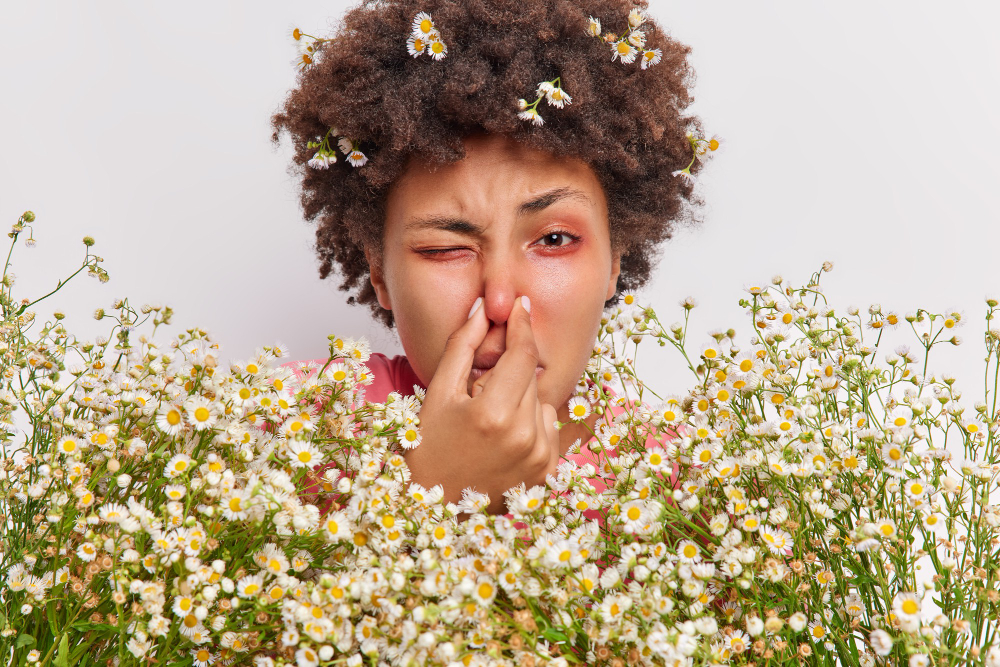
Welcome to spring! While the season brings beautiful blossoms and longer days, it also heralds the arrival of sinus issues and allergies. This year, the combination of early blooms, erratic weather patterns, and increased pollen levels is putting our immune systems to the test. If you find yourself sneezing more often or feeling congested, you’re not alone. Understanding how to manage these symptoms can make a world of difference.
Understanding Allergic Rhinitis and Sinusitis
Allergic Rhinitis and sinusitis are common during spring. Symptoms of allergic rhinitis include:
- Nasal congestion
- Sneezing
- Watery and/or itchy eyes
- Runny and/or itchy nose
- Post-nasal drip
In more severe cases, you might experience:
- Headaches
- Pain and tenderness around the forehead, cheeks, nose, or between the eyes
This discomfort is due to mucus production as your body responds to allergens. Sinusitis, which can occur because of allergies, often manifests with similar symptoms along with facial pain and pressure.
Common Allergens Include:
- Pollen
- Dust mites
- Pet dander
- Pollution
- Certain foods (dairy, gluten, eggs, tomatoes, citrus, bananas, strawberries, processed foods)
Allergic responses can also present as skin rashes or itchiness elsewhere in the body.
The Role of Histamine
Histamine is a chemical your immune system releases in response to allergens. It causes many of the familiar allergic symptoms and can trigger anaphylactic reactions in severe cases. Besides its role in allergies, histamine also regulates sleep-wake cycles and cognitive functions.
Natural Solutions and Alternatives to Conventional Antihistamines
If you’re seeking natural ways to manage your allergy symptoms, consider these alternatives:
- Quercetin: A plant pigment found in onions, apples, berries, green tea, and red wine. It’s known for its antioxidant, anti-inflammatory, and antihistamine properties.
- Bromelain: Derived from pineapple, this enzyme has anti-inflammatory and pain-relieving benefits. Often found in combination with quercetin.
- Vitamin C: An essential antioxidant that supports the immune system and helps maintain bones, cartilage, skin, and blood vessels.
- Pelargonium (Pelaforce): Known for its antibacterial, antiviral, and mucolytic properties, it supports both the immune and respiratory systems.
- Goldenseal: Offers anti-inflammatory, antibacterial, antifungal, and mucolytic benefits. However, it should not be used daily for long periods.
- Turmeric and Ginger: Both are excellent for their anti-inflammatory and immune-boosting properties.
- Elderberries: Rich in vitamin C and quercetin, elderberries provide antioxidant, anti-inflammatory, and antihistamine effects. They also help reduce the severity of respiratory symptoms.
- Olive Leaf: Known for its antiviral, antibacterial, antifungal, and anti-inflammatory properties. It can also help reduce blood pressure and cholesterol levels.
- Echinacea: Boosts immune function and has antibacterial, antiviral, antioxidant, and anti-inflammatory properties.
- Chinese Herbs: Specific herbs can help clear skin heat and dry eczema, and relieve nasal congestion.
- Homeopathic Formulations: Products like Coryzalia can provide relief from allergy symptoms.
- Other Products: Sinuscript and Viralscript are examples of additional supplements that may offer support.
Final Thoughts
While spring is a season of renewal, it can also bring challenges for those with sinus and allergy issues. Understanding the role of histamine and exploring natural remedies can provide significant relief. If symptoms persist or worsen, it’s always a good idea to consult a healthcare professional to tailor a treatment plan for you. Embrace the beauty of spring with a clear head and a well-prepared plan to tackle those pesky allergies!

There are no comments for this article